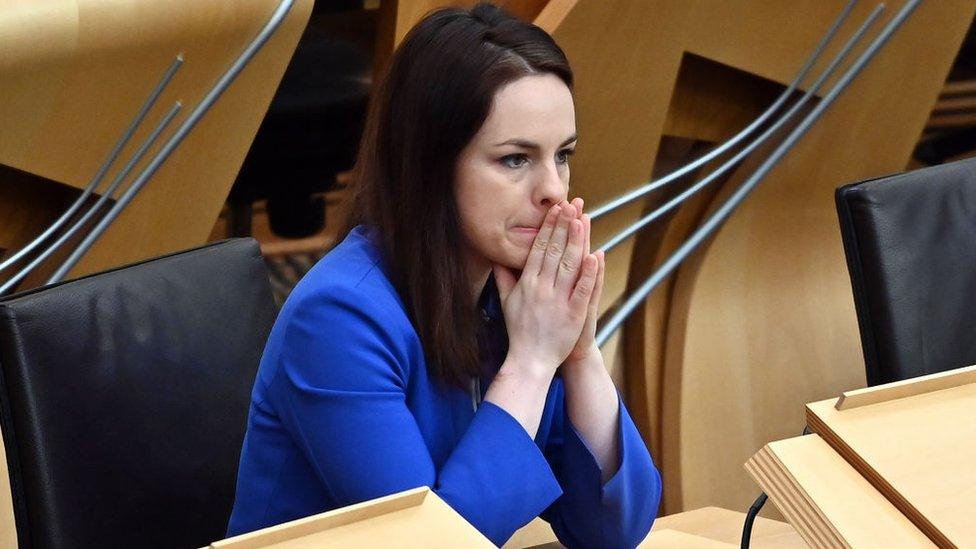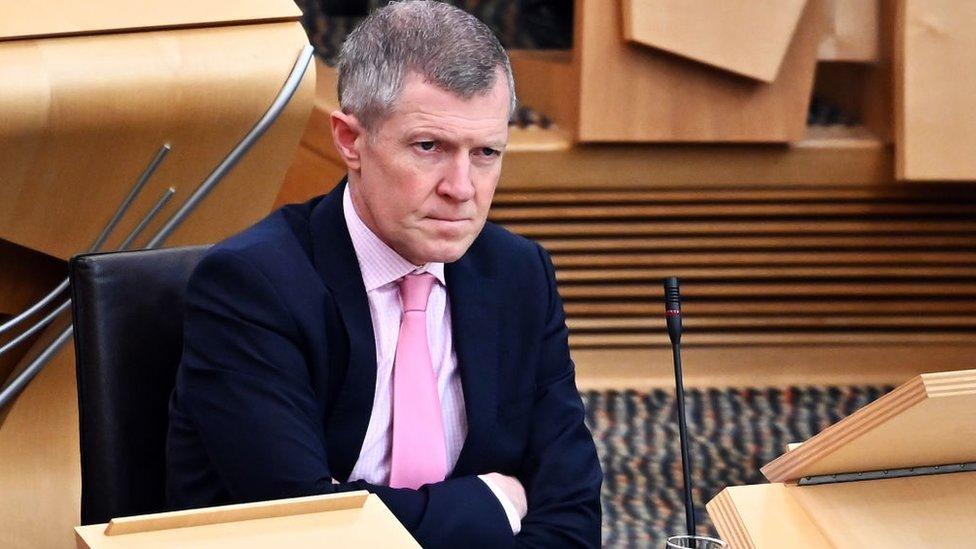Budget timing is of the essence
- Published

Kate Forbes secured her budget deal with the Greens ahead of the Stage One vote
Timing matters in politics. For example, it was useful for the new finance secretary Kate Forbes to secure her deal with the Greens ahead of today's Stage One budget vote.
OK, she could have trachled on, hoping that someone, anyone would abstain at Stage One and she could try again for cross-party agreement before Stages Two and Three.
But it was much neater to have it all tied up. Made things easier for the first minister too, when she was answering questions in the chamber.
Indeed, Nicola Sturgeon was able to taunt and tease other opposition parties, claiming they had now been offered what they said they wanted, notably on additional local government funding.
Why, she asked, were they not now prepared to vote for the budget, along with the Greens who had secured a formal deal?
The Tories, Labour and the Liberal Democrats all submitted extensive lists of finance proposals, like eager offspring lobbying Santa.
Lapland to Airdrie
They didn't get all they wanted. Liberal Democrat expectation had not been particularly high - given that they wanted the SNP to abandon their urgent demands for an independence referendum, in the bygoing.
Bit like asking Santa to sack his reindeer and move from Lapland to Airdrie. Not going to happen.
The Tory ask was mostly about tax. Parity with England or, as a minimum, no further disparity.
They negotiated seriously. But there was always going to be a problem with a putative deal between the principal party of independence and the chief cheerleaders for the Union.
Labour's little list was decidedly ambitious. On spending plans, that is. A bit lighter on how those plans would be afforded - with little detail on alternative economies or added taxation.

Patrick Harvie and the Greens struck a budget deal - but how much did they get out of it?
Again, not really a runner.
Critics say the Greens have secured relatively little, especially with regard to the tax package which remains pristine.
Greens say they obtained extra cash for local government. And a big-ticket offering in plans to provide free bus travel to those aged 18 and under. Expect that to feature prominently in their manifesto next year.
Either way, the deal was well timed. And timing arose, too, in other questions to the FM.
Jackson Carlaw of the Tories complained that John Swinney had, by his calculation, sneaked out a report on exam pass rates late on a Thursday evening, "under cover of darkness".
Work rate
Ms Sturgeon lampooned him in return, saying that if he thought eight o'clock on a Thursday was late, then that said rather a lot about his work rate. He had also, she implied, failed to spot that Mr Swinney was on the wireless the next morning, facing close questioning.
It was all good stuff. Potent discourse. But you know what? If the report had featured unalloyed good news, we might have expected a parliamentary statement or even a Bute House news conference.
Friends, it did not - although Ms Sturgeon contrived with evident success to argue that the longer-term trend was advantageous.
Mr Carlaw was unimpressed. "Time's up", he declared in fine stentorian fashion. For all the world like a grumpy parkie trying to get kids to bring their wee boats to the side of the pond.
There was a timing issue at the core of questions from Labour's Richard Leonard. He raised the closure of certain GP out-of-hours services in Glasgow.

Willie Rennie said Heathrow's third runway plan was undermined by a court decision
This was temporary, insisted the FM, pending reforms to the service to be implemented by the health board. Mr Leonard suggested it was prolonged, rather than fleeting.
From Patrick Harvie of the Greens, an unanswerable question. He queried the business investments in Scotland of Donald Trump.
Ms Sturgeon said she was unable to provide detail to the challenges raised by Mr Harvie. She would check why her team had apparently yet to reply to detailed questions posed by a campaign group.
On the issue of alleged criminality, that would be a matter for the police and Crown Office. Emphatically not for her.
And then Willie Rennie arose, it being a Willie week. The Lib-Dem leader got right to it. Heathrow's third runway plan was undermined, he said, by a court decision.
'Model of clarity'
Did the FM welcome that - or not, given her government's previously declared support for Heathrow expansion?
Her answer, by her own judgement, was a model of clarity. Not entirely sure that would be the verdict of an onlooker.
In October 2016, the SG did indeed reach agreement with Heathrow to back the expansion, given assurances about enhanced connectivity with Scotland and thousands more Scottish jobs.
But the passage of time - and particularly the declaration of a climate emergency - has somewhat altered the outlook. Ms Sturgeon indicated that the Heathrow plan now perhaps sat rather uneasily with that new perspective.
But there was no straightforward repudiation of the Memorandum of Understanding. There was no outright, unequivocal embrace of today's court judgement.
Welcome to government, where caveat and caution are often required.
